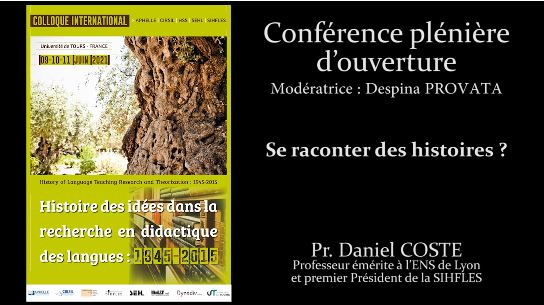Notice
Polina Shvanyukova - Language Education and Gender Studies: Focus on Italy, 1975 – 2015
- document 1 document 2 document 3
- niveau 1 niveau 2 niveau 3
Descriptif
In thiscontribution I shall explore the link between language teaching and the topicalresearch area of Gender Studies (cf. Sunderland 1994, Pavlenko et al. 2001,Decke-Cornill and Volkmann 2007, Linke 2012) in the Italian context. I will doso by focusing on the activities of two well-established Italian associations, Linguae Nuova Didattica (Lend, https://www.lend.it/eu/2016-01-12-11-13-15/chi-siamo) and Gruppi di Intervento nel Campo dell’EducazioneLinguistica (GISCEL, https://giscel.it/), both founded in the 1970s with the aim of bringingtogether language teaching professionals. By examining a range of publicationson the topic of gender and language education produced by the two associations(e.g., Lingua e nuova didattica: Rivista di lingua e di didattica, Quadernidel GISCEL and others, https://giscel.it/documenti/pubblicazioni/) in the period between 1975 and 2015, I aim to address thefollowing research questions: How have language teaching professionals in theItalian context dealt with the “gender issue”? What kind of proposals forgender-informed and gender-conscious approaches have been put forward andimplemented in the period under investigation (for example, by influencingmaterials selection or by providing specific suggestions for thematic and otherclassroom activities)? In other words, how has the theoretical perspective ofGender Studies been incorporated in language teaching and what is the generallevel of awareness of gender-related issues among language teachingprofessionals in Italy? This investigation will be carried out against abackdrop of persistent gender inequality in the Italian education system. AsBiemmi (2015) has recently shown, three key topics (gendered subject choice ineducation; sexism in textbooks; teachers’ lack of awareness of gender issues)currently dominate the Italian academic debate on gender and education, withgender issues in education having only recently “become the focus ofunprecedented political and public attention and the subject of importantlegislative actions” (Biemmi 2015: 813).
Keywords: gender, language education, Italy,textbooks, stereotypes
References
Biemmi, Irene. (2015). “Gender in schoolsand culture: Taking stock of education in Italy”. Gender and Education, 27-7: 812-827.
Decke-Cornill,Helene and Laurenz Volkmann (eds.). (2007). Gender Studies and Foreign Language Teaching. Tübingen: Narr.
Linke, Gabriele.(2012). “Geschlechterforschung und Fachdidaktik: Sprachdidaktik Englisch”. In Marita Kampshoff and Claudia Wiepcke (Hrsg.). Handbuch Geschlechterforschung und Fachdidaktik. Wiesbaden: VS Verlag fürSozialwissenschaften.
Pavlenko, Anetaet al. (eds.). (2001). Multilingualism,Second Language Learning, and Gender. Berlin:Mouton de Gruyter.
Sunderland, Jane(ed.). (1994). Exploring Gender: Questions and Implications forEnglish Language Education.New York et al.: Prentice Hall.
Dans la même collection
-
Jérémi Sauvage - La signification historique de la crise en phonétique corrective
Le but de cette communication sera d’exposer les raisons historiques et épistémologiques qui ont conduit à ce que l’on peut appeler une crise que la phonétique corrective en FLE a connu du milieu des
-
Sarah Dietrich-Grappin et Jésabel Robin - La DDL en tant que discipline autonome ? Restitution disc…
La reconnaissance de la DDL en tant que discipline autonome est intrinsèquement liée à l’histoire des idées et des institutions.
-
Nicola MCLELLAND - The relationship between institutions, advocacy, research, policymaking, and lan…
This paper will explore the relationship of advocacy, policy-making and practice to the practice of language teaching and learning in the UK since 1945, in particular regarding how languages are
-
Robert J. Fouser - Cold War Cosmopolitanism and Theorization of “Culture” and of the “Native Speake…
In this paper, I will explore the relationship between Cold War cosmopolitanism and theorization of the role of culture and of the “native speaker” in foreign language education from 1945 to 1970.
-
-
Sabine Doff - „With a little help from my friends …“ The dialogue between Foreign Language Educatio…
In the decades after World War II the academic landscape in Western Germany was changing slowly, yet profoundly. One major development was the academization of teacher education, i.e. the
-
Pistis Mfwa Croyance - Les français congolais au fil de l'histoire postcoloniale : quelle orientati…
Cette communication se propose de retracer l'histoire de la recherche en didactique du français en République Démocratique du Congo (Ex-Zaïre), partant du début des années soixante-dix (une époque
-
Alice Burrows et Clémentine Rubio - Vers une géopolitique des trajectoires enseignantes : circulati…
L’histoire de la circulation des enseignant.es et des étudiant.es est constitutive de la mise en place d’un champ du français langue étrangère (FLE) (Porcher, 1987). Les “stages de recyclage” du
-
Daniel Coste - Se raconter des histoires ?
Pour quelqu’un qui a été témoin et à l’occasion participant d’un certain nombre d’épisodes qui ont, au cours de ces cinquante dernières années, eu une place dans « l’histoire des idées didactologiques
-
Margaret Bento et Estelle Riquois -L’authenticité : une notion à géométrie variable à travers les m…
En France, dans les années 1970, est apparue dans le champ du FLE une méthodologie dite communicative engendrant une évolution des pratiques de classe. La notion de « document authentique » va se
-
Jésabel ROBIN - De la réception en Suisse alémanique de conceptions didactiques élaborées en France…
Les situations de didactique des langues sont des situations sociolinguistiques. (Blanchet, 2018, p.209) Explicitement ou implicitement, chaque contexte académique est régi par des
-
Ying Zhang-Colin et Mariarosaria Gianninoto - La didactique du chinois langue étrangère, entre « th…
S’il est vrai que la didactique du chinois langue étrangère (CLE) hérite d’une riche tradition philologique et pédagogique (Zhāng 2009), il a fallu néanmoins attendre les dernières décennies












![Ying Zhang-Colin et Mariarosaria Gianninoto - La didactique du chinois langue étrangère, entre « théorie d’ensemble et [théorie] des variables » : une réflexion historico-épistémologique](https://vod.canal-u.tv/videos/media/images/dynadiv/la.didactique.du.chinois.langue.etrang.re.entre.theorie.d.ensemble.et.theorie.des.variables.une.reflexion.historico.epistemologique.ying.zhang.colin.et.mariarosaria.gianninoto_62797/vignette.jpg)